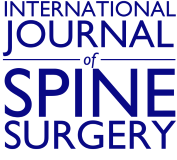ABSTRACT
Background There is a paucity of literature examining surgical trends and outcomes in both child and adult cerebral palsy (CP) patients. We aimed to evaluate surgical trends, complications, length of stay, and charges for spinal deformity surgery in CP patients.
Methods Using the Nationwide Inpatient Sample (NIS) from 2001 to 2013, patients with CP scoliosis who underwent spinal fusion surgery were identified. Patient characteristics and comorbidities were recorded. Trends in spinal fusion approaches were grouped as anterior (ASF), posterior (PSF), or combined anterior-posterior (ASF/PSF). Complication rates, length of stay, and charges for each approach were analyzed. Bivariate analyses using adjusted Wald tests and multivariate analyses using linear (logarithmic transformation) and logistic regressions were performed.
Results Of the 5191 adult CP patients who underwent spinal fusion the majority underwent PSF (86.5%), followed by the ASF/PSF approach (9.3%). The rate of PSF for cerebral palsy patients with spinal deformity increased significantly per 1 million people in the US population (0.90 to 1.30; P = .048). Complication rate, hospital length of stay, and charges were higher for patients undergoing ASF/PSF (P < .05). The overall complication rate for all surgical approaches was 25.7%. Patient comorbidities and combined ASF/PSF increased the odds of complication. Combined ASF/PSF was also associated with an increased length of stay and charges.
Conclusion Combined ASF/PSF in patients with CP accounted for only 9.3% of surgical cases but was associated with the longest hospital stay, highest charges, and increased complications. Further scrutiny of the surgical indications and preoperative risk stratification should be undertaken to minimize complications, reduce length of stay, and decrease charges for CP patients undergoing spinal fusion.
Level of Evidence IV
- Nationwide Inpatient Sample (NIS)
- spinal deformity
- cerebral palsy
- trends
- complications
- hospital charges
- length of stay
Footnotes
Disclosures and COI: This study did not receive any specific grant from funding agencies in the public, commercial, or not-for-profit sectors. Dr Menga reports consulting for Evolution Spine and being Speaker Honoraria for Globus Medical, outside the submitted work. Mr Bernstein has nothing to disclose. Dr Thirukumaran has nothing to disclose. Dr McCormick has nothing to disclose. Dr Rubery reports grants from AOSpine. Dr Mesfin reports grants from LES Society, grants from Corelink, grants from AOSpine, grants from OMeGA, grants from Globus, outside the submitted work.
- ©International Society for the Advancement of Spine Surgery






